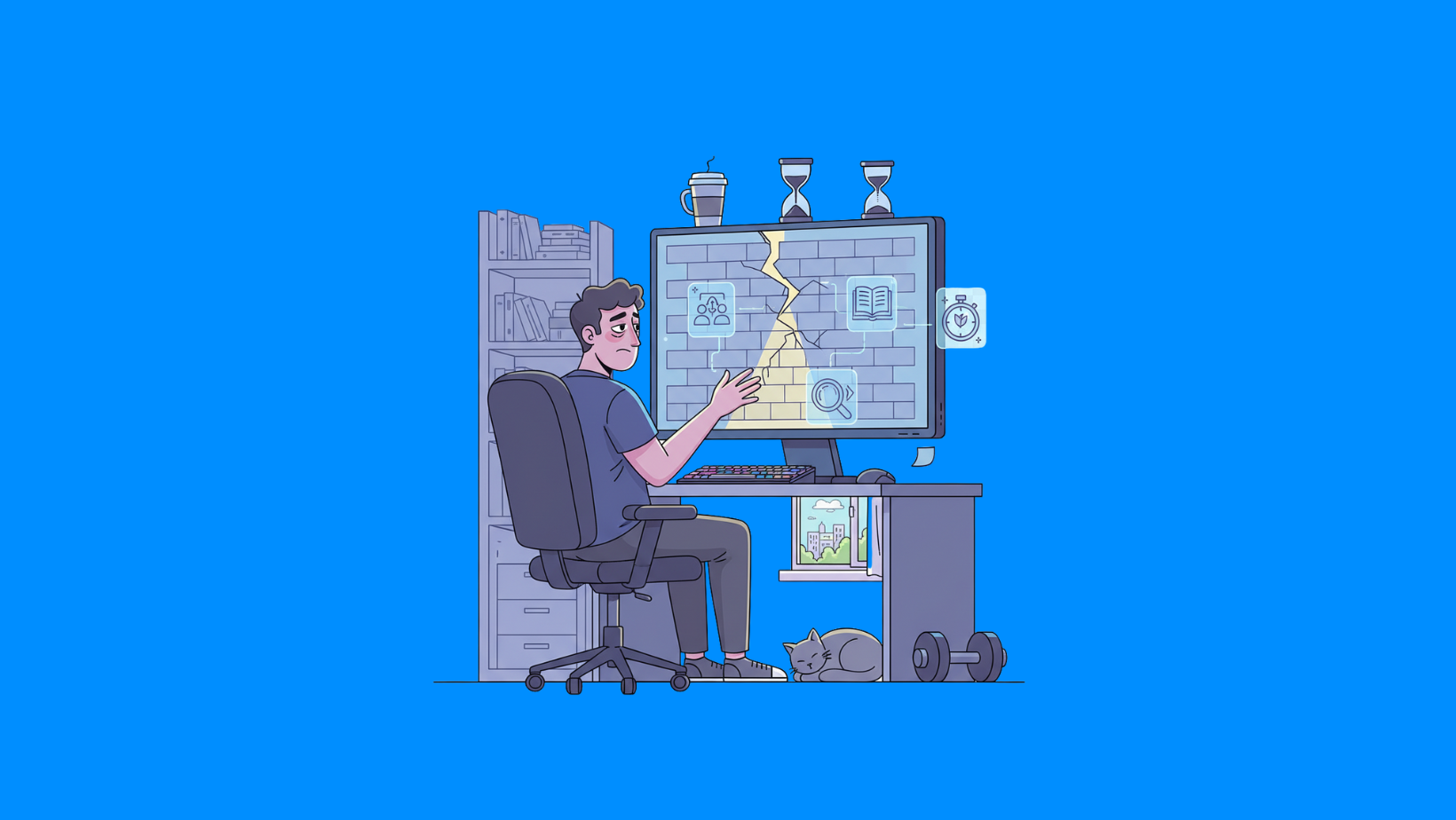When the excitement of a career change fades and the code you once loved starts to feel like homework, you’ve reached your limit as a developer. It’s not about laziness, but about a deep psychological disconnect and you face the developer’s dilemma. We’ll analyze this common struggle, understand the exhaustion and boredom that fuel procrastination, and arm you with practical tools, from Body Doubling to Deep Work strategies, to help you regain your focus and, more importantly, the joy of building.
What Are the Root Causes of Procrastination?
Before we try to solve the developer’s dilemma, let’s understand why it exists. In fact, we face several common psychological pitfalls when working at a fast pace in the tech field.
The ‘Burnout’ vs. ‘Boredom’ Trap
Initial passion is an excellent fuel, but it often burns out quickly in the face of the intense and uninterrupted learning curve of technology. After three years, the novelty wears off. Burnout is characterized by fatigue, cynicism, and reduced professional effectiveness. However, sometimes the problem is simply boredom; tasks are no longer challenging or perceived as meaningful. For someone who has made a radical career change, it is possible to have unintentionally replaced a high-stress, low-novelty environment with another, leading to an eventual energy crashand, if we can call it that, facilitating the developer’s dilemma.
The Tyranny of Unstructured Work
For many developers, especially those who work remotely or as entrepreneurs, the work environment has no natural boundaries or social accountability. This lack of psychological structure makes distraction and procrastination incredibly easy, forcing reliance on self-discipline, which, unfortunately, is a limited resource. When your office is a meter away from your bed, the effort required to start working is great, and the effort required to stop is non-existent.
Pro tip: To tell real burnout from just a rough patch, check out the ideas in Byung-Chul Han’s book “The Burnout Society” for a philosophical take on the performance pressure that comes with modern intellectual work.
The Toolkit: Practical Strategies for Reclaiming Motivation
When self-starters get stuck, the solution often lies in structural adjustments, not just willpower. Here are three powerful strategies that can help you reset your developer mindset:
1. Externalize Discipline: The Accountability Hack
Since self-discipline clearly doesn’t work (it happens to even the best of us!), the key is to outsource it.
- The Body Doubling technique: Work in the presence of another person, even if they are silent and distant. Whether it’s an online collaboration platform or a simple video call with a colleague, where you both work quietly, can dramatically reduce the urge to stray from the task at hand. The mere presence of an observer changes your behavior.
- The “Commit to stopping” rule: Instead of struggling to get started, commit to stopping at a strict, non-negotiable time (e.g., 5 p.m.). Knowing that the workday will end at a fixed time will make the morning seem much less daunting.
2. Micro-Goals and the Power of ‘Flow’
The mere idea of a large-scale project can cause paralysis. The antidote is to break down the tasks until the first step becomes almost embarrassingly small.
- The Pomodoro Technique (refined): use the 25-minute cycle of concentration/5-minute break, but make your 25-minute goal absurdly specific and simple. “I will only write the basic HTML structure for the new module”, no CSS, no logic. Success creates immediate and positive momentum.
- Reintroducing the “flow” state: Many developers fall in love with programming through personal projects. Reintroduce a low-stakes side project (a small game, a utility script) using a new framework or technology. Focus on the joy of creation, not just the obligation of work, to rekindle your initial passion.
Pro tip: To master focus and flow, look no further than Cal Newport’s Deep Work: Rules for Focused Success in a Distracted World. His practical techniques for minimizing distraction are vital for any knowledge worker struggling with procrastination.
Change the Scenery, Change the Brain
Your home office can become a psychological cage, associating your workspace with feelings of stress and failure.
- The third place rule: work remotely from a café, public library, or dedicated coworking space one or two days a week. The physical act of traveling to work (even for a short time) signals to your brain that it’s time to be productive and breaks the negative association with your home office.
- Invest in novelty: Sometimes, a small change in your physical environment provides a huge psychological boost. Treat yourself to some new equipment, a tactile mechanical keyboard, a vertical monitor, or a small lighting upgrade, to make your workspace feel fresh again.
In conclusion
The developer’s dilemma is complex and often demanding, but the intrinsic rewards, problem solving, and creative fulfillment are worth the struggle. When faced with difficulties, stop searching for willpower and start building better systems.
And trust us, we at BluDeskSoft have been there too. That moment when you look at the clock, pretending that the JIRA ticket doesn’t exist? We recognize it. But we’ve learned that the wall isn’t built on a lack of skills, but on too much pressure and too little structured fun. You just need to find your next small victory, schedule your Deep Work session, and maybe, just maybe, buy yourself a ridiculous new mechanical keyboard. The passion is still there; it just needs a reboot, not a complete reset.

